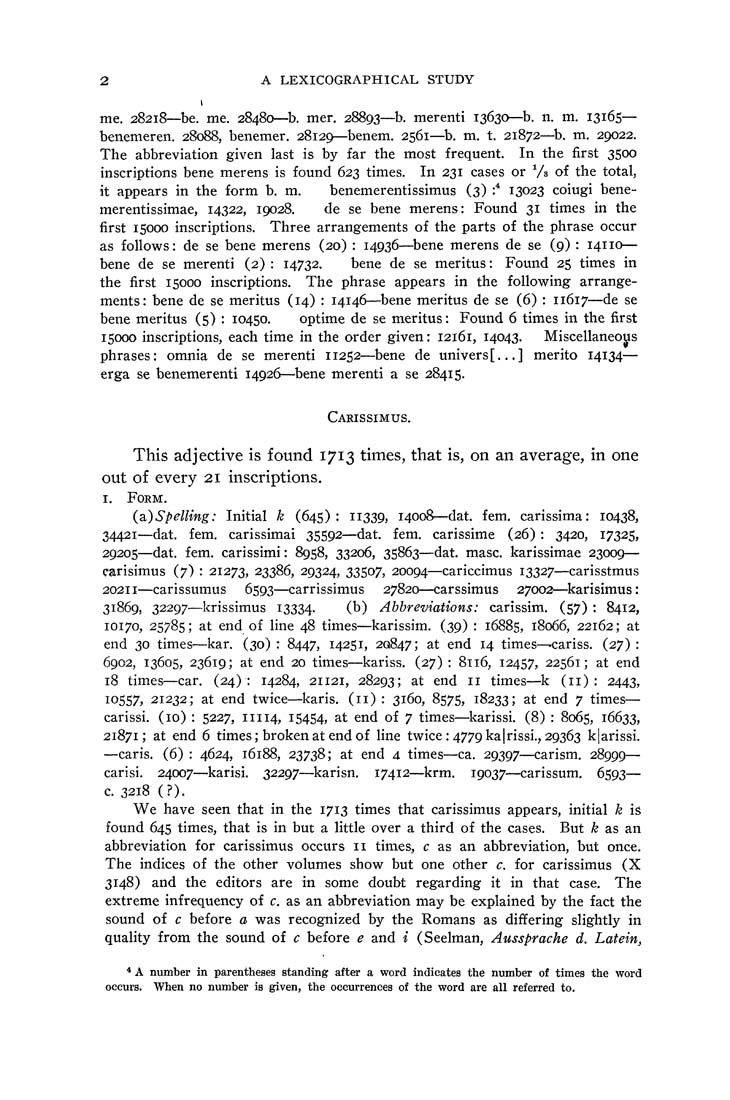2 A LEXICOGRAPHICAL STUDY
me. 28218—be. me. 28480—b. mer. 28893—b. merenti 13630—b. n. m. 13165—
benemeren. 28088, benemer. 28129—benem. 2561—^b. m. t. 21872—b. m. 29022.
The abbreviation given last is by far the most frequent. In the first 3500
inscriptions bene merens is found 623 times. In 231 cases or Vs of the total,
it appears in the form b. m. benemerentissimus (3) :* 13023 coiugi bene-
merentissimae, 14322, 19028. de se bene merens: Found 31 times in the
first 15000 inscriptions. Three arrangements of the parts of the phrase occur
as follows: de se bene merens (20) : 14936—^bene merens de se (9) : 14110—
bene de se merenti (2) : 14732. bene de se meritus: Found 25 times in
the first 15000 inscriptions. The phrase appears in the following arrange¬
ments: bene de se meritus (14) : 14146—^bene meritus de se (6) : 11617—de se
bene meritus (5) : 10450. optime de se meritus: Found 6 times in the first
15000 inscriptions, each time in the order given: 12161, 14043. Miscellaneojis
phrases: omnia de se merenti 11252—bene de univers[...] merito 14134—
erga se benemerenti 14926—^bene merenti a se 28415.
Carissimus.
This adjective is found 1713 times, that is, on an average, in one
out of every 21 inscriptions.
I. Form.
(a,)Spelling: Initial k (645): 11339, 14008—dat. fem. carissima: 10438,
34421—dat. fem. carissimai 35592—dat. fem. carissime (26) : 3420, 17325,
29205—dat. fem. carissimi: 8958, 33206, 35863—dat. masc. karissimae 23009—
carisimus (7) : 21273, 23386, 29324, 33507, 20094^—cariccimus 13327—carisstmus
20211—carissumus 6593—carrissimus 27820—carssimus 27002—karisimus:
31869, 32297—krissimus 13334. (b) Abbreviations: carissim. (57) : 8412,
10170, 25785; at end of line 48 times—karissim. (39) : 16885, 18066, 22162; at
end 30 times—kar. (30) : 8447, 14251, 20847; at end 14 times—cariss. (27) :
6902, 13605, 23619; at end 20 times—^kariss. (27) : 8116, 12457, 22561; at end
18 times—car. (24): 14284, 21121, 28293; at end 11 times—k (11): 2443,
10557, 21232; at end twice—karis. (11) : 3160, 8575, 18233; at end 7 times—
carissi. (10) : 5227, 11114, 15454, at end of 7 times—^karissi. (8) : 8065, 16633,
21871; at end 6 times; broken at end of line twice: 4779 ka|rissi., 29363 k|arissi.
—caris. (6) : 4624, 16188, 23738; at end 4 times—ca. 29397—carism. 28999—
carisi. 24007—karisi. 32297—^karisn. 17412—^krm. 19037—carissum. 6593—
c. 3218 (?).
We have seen that in the 1713 times that carissimus appears, initial k is
found 645 times, that is in but a little over a third of the cases. But k as an
abbreviation for carissimus occurs 11 times, c as an abbreviation, but once.
The indices of the other volumes show but one other c. for carissimus (X
3148) and the editors are in some doubt regarding it in that case. The
extreme infrequency of c. as an abbreviation may be explained by the fact the
sound of c before a was recognized by the Romans as differing slightly in
quality from the sound of c before e and i (Seelman, Aussprache d. Latein,
* A number in parentheses standing after a word indicates the number of times the word
occurs. When no number is given, the occurrences of the word are all referred to.
|








